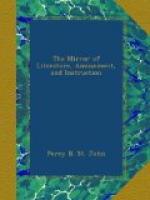He reigns!—but mark! how self-reproach
Pervades his inmost breast;—
And pangs of sad remorse encroach
Upon his fever’d rest.
He lives—but life has little
left,
If aught, his love to claim;
Of all, save grief, ’tis now bereft;
To him ’tis but a name!
J.H.I.
The event which the foregoing stanzas have attempted to describe laid the foundation of the future importance and prosperity of the Cathedral church of Hereford.
“The restless ambition of Offa prompted him to attack the neighbouring kingdom of the East Angles, with a view of adding it to his dominions; but in this attempt he was defeated by the successful valour of Ethelbert. Peace being subsequently concluded, Offa acceded to proposals of marriage between Ethelbert and his daughter Elfrida;—and the young and unsuspecting prince attended, invited, at the palace of Offa (at South Town, now Sutton, near Hereford), with a splendid retinue, to treat of the intended spousals. The queen of Offa, Quendreda, is recorded to have prevailed upon her husband to violate the ties of hospitality and humanity; and Ethelbert was treacherously murdered, A.D. 793. His guards and retinue were dispersed; his kingdom, taken by surprise, was annexed to the state of Mercia. The faithful Elfrida retired to Croyland Abbey; and Offa, seized with remorse, sought to appease his wounded conscience by actions which, at that time, were thought to atone for the deepest delinquency. He caused the body of Ethelbert to be removed from Marden, where it had been previously interred, to the cathedral of St. Mary, at Hereford, erecting over him a magnificent tomb, and endowing the church with valuable gifts, chiefly situated in the immediate vicinity of his own palace. The known virtues of the murdered prince caused his shrine to be visited as that of a martyr; and such was the fame of his miracles, that the city and cathedral attained a degree of opulence from the pious contributions of devoted pilgrims.”
Wright’s History of Hereford.
It is not asserted that Ethelbert was murdered on the day appointed for his marriage; but poetical license will, it is hoped, be pardoned for the variation, whilst the principal facts are strictly adhered to.
* * * * *
RETROSPECTIVE GLEANINGS.
* * * * *
PARLIAMENTS.
(Concluded from vol. xvii.)
In 833, a parliament was held at London, in the presence of King Egbert, with his son Ethelwolf, and Withlaf, the tributary King of Mercia, and most of the prelates and great men of the realm, to deliberate on the best means they could adopt to prevent the Danes from invading England.
In 1210, King John summoned a parliament to meet him at his palace in St. Bride’s parish, London; where he exacted of the clergy and religious persons the sum of 100,000_l._, and 40,000_l._ in particular from the white monks. The present hospital of Bridewell stands on a part of that palace.




